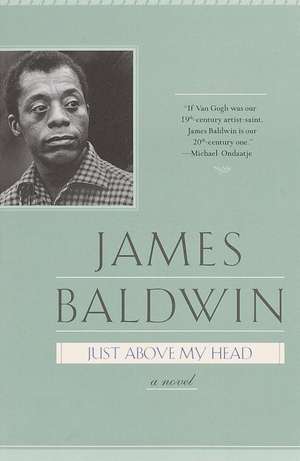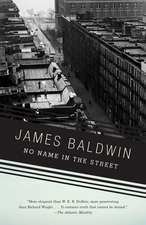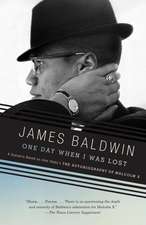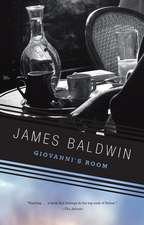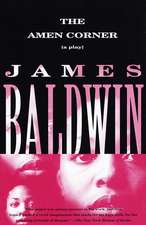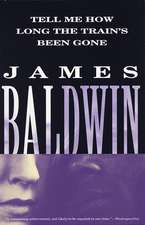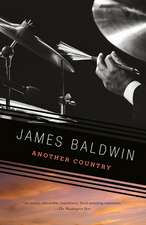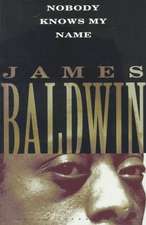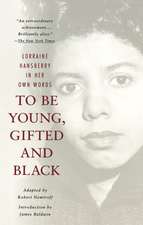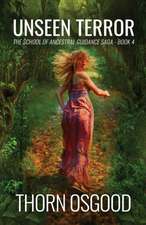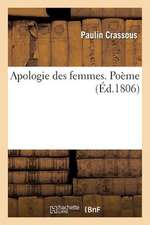Just Above My Head
Autor James A. Baldwinen Limba Engleză Paperback – 31 mai 2000
Preț: 102.28 lei
Nou
Puncte Express: 153
Preț estimativ în valută:
19.57€ • 20.36$ • 16.16£
19.57€ • 20.36$ • 16.16£
Carte disponibilă
Livrare economică 24 martie-07 aprilie
Preluare comenzi: 021 569.72.76
Specificații
ISBN-13: 9780385334563
ISBN-10: 0385334567
Pagini: 592
Dimensiuni: 135 x 201 x 30 mm
Greutate: 0.48 kg
Editura: DELTA
ISBN-10: 0385334567
Pagini: 592
Dimensiuni: 135 x 201 x 30 mm
Greutate: 0.48 kg
Editura: DELTA
Extras
THE DAMN'D BLOOD BURST, first through his nostrils, then pounded through the veins in his neck, the scarlet torrent exploded through his mouth, it reached his eyes and blinded him, and brought Arthur down, down, down, down, down.
The telephone call did not go into these details, neither did the telegram: urgently demanding my arrival because my brother was dead. The laconic British press merely noted that a "nearly forgotten Negro moaner and groaner" (this is how the British press described my brother) had been found dead in a men's room in the basement of a London pub. No one told me how he died. The American press noted the passing of an "emotion-filled" gospel singer, dead at the untidy age of thirty-nine.
He had been losing his hair, that rain forest of Senegalese hair, I knew that. Jimmy had not been with him; Jimmy had been waiting for him in Paris, to bring him home. Julia had been clearing up their rooms in her house in Yonkers.
I: sat by the telephone. I looked at the marvel of human effort, the telephone. The telephone beside my bed was black--like me, I think I thought, God knows why I thought it, if I did. The telephone in the bathroom was gray. The telephone in the kitchen was blue, light blue.
The sun was shining that morning, like I've never known the sun to shine before.
He had been found lying in a pool of blood--why does one say a pool?--a storm, a violence, a miracle of blood: his blood, my brother's blood, my brother's blood, my brother's blood! My blood, my brother's blood, my blood, Arthur's blood, soaking into the sawdust of some grimy men's room in the filthy basement of some filthy London pub.
Oh. No. Arthur. I think I laughed. I think I couldn't cry. My brother.
The house was empty. Ruth was out shopping, Tony and Odessa were at school: it was a Thursday morning.
My brother. Do you know, friend, how a brother loves his brother, how mighty, how unanswerable it is to be confronted with the truth beneath that simple word? Simple. Word. Yes. No. Everything becomes unanswerable, unreadable, in the face of an event yet more unimaginable than one's own death. It is one's death, occurring far beyond the confines of one's imagination. Or, surely, far beyond the confines of my imagination. And do you know, do you know, how much my brother loved me? how much he loved me! And do you know I did not know it? did not dare to know it: do you know? No. No. No.
I looked and looked and looked at the telephone: I looked at the telephone and I looked at the telephone. The telephone was silent. This was the black telephone. I stumbled to the gray telephone, in the bathroom. Perhaps I thought that it might have mercy on me if I humbled myself on the toilet. Nothing came out of me, not even water, and the phone did not ring. I walked to the light-blue telephone in the kitchen, and looked at it and looked at it: it looked at me, from somewhere over the light-blue rainbow, and it did not ring, it did not ring, it did not ring! It did not ring. How can you do this to me, how can you tell me what you have just told me, and now, sit there like that, over the motherfucking goddamn rainbow! and hold your peace? Oh. If you were a man, like me. Oh. Oh. Oh. Arthur. Speak. Speak. Speak. I know, I know. I wasn't always nice to you, I yelled when I shouldn't have yelled, I was often absent when I should have been present, I know, I know; and sometimes you bored the shit out of me, and I heard your stories too often, and I knew all your fucking little ways, man, and how you jived the people--but that's not really true, you didn't really jive the people, you sang, you sang, and if there was any jiving done, the people jived you, my brother, because they didn't know that they were the song and the price of the song and the glory of the song: you sang. Oh, my God my God my God my God my God, oh my God my God my God oh no no no, my God my God my God my God, forsake me if you will and I don't give a shit but give me back my brother, my God my God my God my God my God!
I did not cry. Nothing came out of me, not even water. I stood, as dumb and naked as a horse, under the shower. I dried myself, and I shaved--very very slowly, very very carefully: I was shaving someone else. I looked into my eyes: they were someone else's eyes. I combed my hair. The phone did not ring. Soon I would have to pick it up and dial a number and get on a plane. London Bridge is falling down. My fair lady.
Ruth found me naked, flat on my back, on the bathroom floor, my razor in my hand: and the phone was ringing.
Two years ago: if Arthur were alive now, he would be approaching forty-one. I am the older brother, and I will be forty-eight this year.
My name is Hall: Hall Montana. I was born in California, but Arthur was born in New York and we grew up in New York.
Our father, Paul, died several years back--died, I think, from having crossed a continent to find himself in New York. He had been born in Tallahassee, grew up in New Orleans, and had had a rough, rough time in California. He died, anyway, while Arthur was still Arthur, thank God; he split the scene before Arthur started down. Florence, our mother, once Arthur was in the ground, went back to New Orleans--where she and Paul had met--and she's staying there now, with one of her younger sisters. Ruth, and myself, and the kids try to make it down there for a couple of weeks every summer, and sometimes I bring Mama up here, for Christmas. But she doesn't like it up here. Maybe she never did--but now, when she visits, I can feel her flinching. She doesn't say anything, the pain is at the very bottom of her eyes. I catch it sometimes, when she's just sitting still, looking at television or looking out of the window, or sometimes, when she's walking along the street. She doesn't like to go to church up here. She says that the people don't have any spirit, that their religion ain't nothing but noise and show: they've lost the true religion. That may be true. I don't go to church myself. But even if what she says is true, and I remember, too, how these people treated Arthur when he branched out from gospel, that's not the reason. Any church up here might have Jesus on the main line all day and all night long, and Mama would never so lower herself as to go anywhere near that phone. No, never. She doesn't like this city because it robbed her of her son, and she feels that the people in the church, when they turned against him, became directly responsible for his death. She goes to church down home, though, where she can grieve and pray, away from all the spiteful people whose tongues so lacerated her boy. She can sing to herself, without fear of being mocked, and find strength and solace in the song that says, They didn't know who you were. And she's not singing about Jesus, then, she's singing about her son. Maybe all gospel songs begin out of blasphemy and presumption--what the church would call blasphemy and presumption: out of entering God's suffering and challenging God Almighty to have or to give or to withhold mercy. There will be two of us at the mercy seat: my Lord, and I!
Two years ago: and I have never really talked about it: not to Ruth, not to my children, Tony and Odessa (who love their uncle), not to Julia, not to Jimmy: and they can't talk about it until I can talk.
I know I'm wrong to trap them in my silence. Maybe it's partly because I was Arthur's manager. I had to talk about him for years, living, and then, dead, as a property, as a star: I had to protect him because Lord have mercy that nappy-headed mother did not know how to protect himself. That made me afraid that I'd lose him as my brother: that he would think that I also thought of him as the can of beans anybody could buy and which everybody sold--and down the river, baby, at a mighty handsome profit.
I don't think that he thought of me that way. I know he didn't. If he had, he would have died much sooner. I know it because I know that he never tried to hide anything from me, though sometimes, he tried to protect me, too. I know I loved him, and he knew it; with all my heart, I loved him; even when he made me so mad sometimes that I felt like I wanted to beat his brains out. He made his life so hard! Well. That's not true, either. He lived the life he lived, like anybody, I guess, and he paid his dues, like everybody. Maybe what I mean when I say he made his life so hard was that he always tried to pay his dues in front. That isn't always possible: it can even be called a bad habit. Maybe some dues are paid. Some dues may be just a bad memory; but you can't really take that for granted unless you can trust your memory. The truth, anyway, is that I wouldn't really give a shit about all these abstract speculations if I weren't trying to talk about my brother. He was on stage. He caught the light, and so I saw him: more clearly than I will ever see myself.
The telephone call did not go into these details, neither did the telegram: urgently demanding my arrival because my brother was dead. The laconic British press merely noted that a "nearly forgotten Negro moaner and groaner" (this is how the British press described my brother) had been found dead in a men's room in the basement of a London pub. No one told me how he died. The American press noted the passing of an "emotion-filled" gospel singer, dead at the untidy age of thirty-nine.
He had been losing his hair, that rain forest of Senegalese hair, I knew that. Jimmy had not been with him; Jimmy had been waiting for him in Paris, to bring him home. Julia had been clearing up their rooms in her house in Yonkers.
I: sat by the telephone. I looked at the marvel of human effort, the telephone. The telephone beside my bed was black--like me, I think I thought, God knows why I thought it, if I did. The telephone in the bathroom was gray. The telephone in the kitchen was blue, light blue.
The sun was shining that morning, like I've never known the sun to shine before.
He had been found lying in a pool of blood--why does one say a pool?--a storm, a violence, a miracle of blood: his blood, my brother's blood, my brother's blood, my brother's blood! My blood, my brother's blood, my blood, Arthur's blood, soaking into the sawdust of some grimy men's room in the filthy basement of some filthy London pub.
Oh. No. Arthur. I think I laughed. I think I couldn't cry. My brother.
The house was empty. Ruth was out shopping, Tony and Odessa were at school: it was a Thursday morning.
My brother. Do you know, friend, how a brother loves his brother, how mighty, how unanswerable it is to be confronted with the truth beneath that simple word? Simple. Word. Yes. No. Everything becomes unanswerable, unreadable, in the face of an event yet more unimaginable than one's own death. It is one's death, occurring far beyond the confines of one's imagination. Or, surely, far beyond the confines of my imagination. And do you know, do you know, how much my brother loved me? how much he loved me! And do you know I did not know it? did not dare to know it: do you know? No. No. No.
I looked and looked and looked at the telephone: I looked at the telephone and I looked at the telephone. The telephone was silent. This was the black telephone. I stumbled to the gray telephone, in the bathroom. Perhaps I thought that it might have mercy on me if I humbled myself on the toilet. Nothing came out of me, not even water, and the phone did not ring. I walked to the light-blue telephone in the kitchen, and looked at it and looked at it: it looked at me, from somewhere over the light-blue rainbow, and it did not ring, it did not ring, it did not ring! It did not ring. How can you do this to me, how can you tell me what you have just told me, and now, sit there like that, over the motherfucking goddamn rainbow! and hold your peace? Oh. If you were a man, like me. Oh. Oh. Oh. Arthur. Speak. Speak. Speak. I know, I know. I wasn't always nice to you, I yelled when I shouldn't have yelled, I was often absent when I should have been present, I know, I know; and sometimes you bored the shit out of me, and I heard your stories too often, and I knew all your fucking little ways, man, and how you jived the people--but that's not really true, you didn't really jive the people, you sang, you sang, and if there was any jiving done, the people jived you, my brother, because they didn't know that they were the song and the price of the song and the glory of the song: you sang. Oh, my God my God my God my God my God, oh my God my God my God oh no no no, my God my God my God my God, forsake me if you will and I don't give a shit but give me back my brother, my God my God my God my God my God!
I did not cry. Nothing came out of me, not even water. I stood, as dumb and naked as a horse, under the shower. I dried myself, and I shaved--very very slowly, very very carefully: I was shaving someone else. I looked into my eyes: they were someone else's eyes. I combed my hair. The phone did not ring. Soon I would have to pick it up and dial a number and get on a plane. London Bridge is falling down. My fair lady.
Ruth found me naked, flat on my back, on the bathroom floor, my razor in my hand: and the phone was ringing.
Two years ago: if Arthur were alive now, he would be approaching forty-one. I am the older brother, and I will be forty-eight this year.
My name is Hall: Hall Montana. I was born in California, but Arthur was born in New York and we grew up in New York.
Our father, Paul, died several years back--died, I think, from having crossed a continent to find himself in New York. He had been born in Tallahassee, grew up in New Orleans, and had had a rough, rough time in California. He died, anyway, while Arthur was still Arthur, thank God; he split the scene before Arthur started down. Florence, our mother, once Arthur was in the ground, went back to New Orleans--where she and Paul had met--and she's staying there now, with one of her younger sisters. Ruth, and myself, and the kids try to make it down there for a couple of weeks every summer, and sometimes I bring Mama up here, for Christmas. But she doesn't like it up here. Maybe she never did--but now, when she visits, I can feel her flinching. She doesn't say anything, the pain is at the very bottom of her eyes. I catch it sometimes, when she's just sitting still, looking at television or looking out of the window, or sometimes, when she's walking along the street. She doesn't like to go to church up here. She says that the people don't have any spirit, that their religion ain't nothing but noise and show: they've lost the true religion. That may be true. I don't go to church myself. But even if what she says is true, and I remember, too, how these people treated Arthur when he branched out from gospel, that's not the reason. Any church up here might have Jesus on the main line all day and all night long, and Mama would never so lower herself as to go anywhere near that phone. No, never. She doesn't like this city because it robbed her of her son, and she feels that the people in the church, when they turned against him, became directly responsible for his death. She goes to church down home, though, where she can grieve and pray, away from all the spiteful people whose tongues so lacerated her boy. She can sing to herself, without fear of being mocked, and find strength and solace in the song that says, They didn't know who you were. And she's not singing about Jesus, then, she's singing about her son. Maybe all gospel songs begin out of blasphemy and presumption--what the church would call blasphemy and presumption: out of entering God's suffering and challenging God Almighty to have or to give or to withhold mercy. There will be two of us at the mercy seat: my Lord, and I!
Two years ago: and I have never really talked about it: not to Ruth, not to my children, Tony and Odessa (who love their uncle), not to Julia, not to Jimmy: and they can't talk about it until I can talk.
I know I'm wrong to trap them in my silence. Maybe it's partly because I was Arthur's manager. I had to talk about him for years, living, and then, dead, as a property, as a star: I had to protect him because Lord have mercy that nappy-headed mother did not know how to protect himself. That made me afraid that I'd lose him as my brother: that he would think that I also thought of him as the can of beans anybody could buy and which everybody sold--and down the river, baby, at a mighty handsome profit.
I don't think that he thought of me that way. I know he didn't. If he had, he would have died much sooner. I know it because I know that he never tried to hide anything from me, though sometimes, he tried to protect me, too. I know I loved him, and he knew it; with all my heart, I loved him; even when he made me so mad sometimes that I felt like I wanted to beat his brains out. He made his life so hard! Well. That's not true, either. He lived the life he lived, like anybody, I guess, and he paid his dues, like everybody. Maybe what I mean when I say he made his life so hard was that he always tried to pay his dues in front. That isn't always possible: it can even be called a bad habit. Maybe some dues are paid. Some dues may be just a bad memory; but you can't really take that for granted unless you can trust your memory. The truth, anyway, is that I wouldn't really give a shit about all these abstract speculations if I weren't trying to talk about my brother. He was on stage. He caught the light, and so I saw him: more clearly than I will ever see myself.
Recenzii
"If Van Gogh was our 19th-century artist-saint, James Baldwin is our 20th-century one."
--Michael Ondaatje
"The work of a born storyteller at the height of his powers... glimpses of family life in Harlem, rapturous music-making in the churches, moments of uneasiness in even the most casual meetings between whites and blacks--scenes that Baldwin seems preternaturally gifted in understanding."
--The New York Times Book Review
"A fine novel...it seems impossible for [Baldwin] to write with anything other than eloquence. His great and peculiar power is to re-create the maddening halfway house that the black man finds himself in late-twentieth-century America."
--The New Yorker
--Michael Ondaatje
"The work of a born storyteller at the height of his powers... glimpses of family life in Harlem, rapturous music-making in the churches, moments of uneasiness in even the most casual meetings between whites and blacks--scenes that Baldwin seems preternaturally gifted in understanding."
--The New York Times Book Review
"A fine novel...it seems impossible for [Baldwin] to write with anything other than eloquence. His great and peculiar power is to re-create the maddening halfway house that the black man finds himself in late-twentieth-century America."
--The New Yorker
